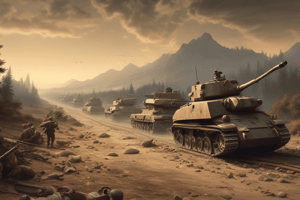Podcast
Questions and Answers
What was a consequence of the Treaty of Versailles on Germany?
What was a consequence of the Treaty of Versailles on Germany?
- Increased economic prosperity
- Immediate surrender to the Allied forces
- Widespread resentment and a desire for revenge (correct)
- Improved relations with Britain and France
What was the name of the operation launched by Germany in 1941?
What was the name of the operation launched by Germany in 1941?
- Operation Barbarossa (correct)
- Operation Neptune
- Operation Market Garden
- Operation Overlord
Which event marked a turning point in the war?
Which event marked a turning point in the war?
- Battle of Britain
- Attack on Pearl Harbor
- Invasion of Poland
- D-Day and the Allied Invasion of Normandy (correct)
What was the outcome of the Battle of Britain?
What was the outcome of the Battle of Britain?
Which event led to the declaration of war by Britain and France?
Which event led to the declaration of war by Britain and France?
What was the global economic crisis of the 1930s known as?
What was the global economic crisis of the 1930s known as?
What event led to Japan's surrender and the end of World War II?
What event led to Japan's surrender and the end of World War II?
Which of the following leaders initially allied with Hitler before switching to the Allied side?
Which of the following leaders initially allied with Hitler before switching to the Allied side?
What was the estimated human cost of World War II?
What was the estimated human cost of World War II?
What was one of the key consequences of World War II?
What was one of the key consequences of World War II?
Which of the following was NOT one of the Axis Powers?
Which of the following was NOT one of the Axis Powers?
What international organization was formed as a result of World War II?
What international organization was formed as a result of World War II?
Flashcards are hidden until you start studying
Study Notes
Causes of World War II
- The Treaty of Versailles (1919) imposed harsh penalties on Germany, leading to widespread resentment and a desire for revenge.
- The global economic crisis of the 1930s (The Great Depression) led to high levels of unemployment and poverty in Germany, creating an environment in which extremist ideologies could flourish.
- The rise of fascist and nationalist ideologies in Europe, particularly in Germany, Italy, and Japan.
- The policy of appeasement adopted by Britain and France, which allowed Germany to remilitarize the Rhineland and annex Austria.
Major Events of World War II
- Invasion of Poland (1939): Germany, under Adolf Hitler, invaded Poland, leading to the declaration of war by Britain and France.
- Battle of Britain (1940): The German air force (Luftwaffe) attempted to gain air superiority over the UK, but was ultimately defeated by the British Royal Air Force (RAF).
- Invasion of the Soviet Union (1941): Germany launched a massive invasion of the Soviet Union, known as Operation Barbarossa, which led to a prolonged and costly conflict on the Eastern Front.
- Attack on Pearl Harbor (1941): Japan launched a surprise attack on the United States naval base at Pearl Harbor, Hawaii, drawing the US into the war.
- D-Day and the Allied Invasion of Normandy (1944): Allied forces launched a massive invasion of Nazi-occupied France, marking a turning point in the war.
- Atomic Bombings of Hiroshima and Nagasaki (1945): The US dropped atomic bombs on the Japanese cities of Hiroshima and Nagasaki, leading to Japan's surrender and the end of the war.
Key Players and Alliances
- Axis Powers: Germany, Italy, Japan, and their allies.
- Allied Powers: The United States, the United Kingdom, France, the Soviet Union, and their allies.
- Adolf Hitler: The leader of Nazi Germany, who played a key role in the outbreak and progression of the war.
- Benito Mussolini: The leader of fascist Italy, who allied with Hitler and Japan.
- Joseph Stalin: The leader of the Soviet Union, who initially allied with Hitler before switching to the Allied side.
- Winston Churchill: The Prime Minister of the United Kingdom, who played a key role in rallying the British people during the war.
- Franklin D. Roosevelt: The President of the United States, who led the country through the war and played a key role in shaping the post-war world.
Consequences of World War II
- Human Cost: An estimated 50-80 million people lost their lives, including six million Jews who were systematically murdered by the Nazis during the Holocaust.
- Destruction and Devastation: Many cities and towns were destroyed, and entire communities were displaced.
- Rise of the United States and the Soviet Union: The war marked the emergence of the US and the USSR as superpowers, setting the stage for the Cold War.
- Formation of the United Nations: The war led to the creation of the United Nations, an international organization dedicated to promoting peace and security.
- Redrawing of National Borders: The war led to the redrawing of national borders, with the formation of new countries and the reorganization of others.
Studying That Suits You
Use AI to generate personalized quizzes and flashcards to suit your learning preferences.



